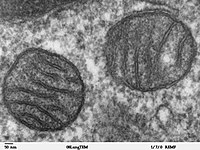
Photo from wikipedia
Doxorubicin (DXR) is a drug widely used in chemotherapy. Its mode of action is based on its intercalation properties, involving the inhibition of topoisomerase II. However, few studies have reported… Click to show full abstract
Doxorubicin (DXR) is a drug widely used in chemotherapy. Its mode of action is based on its intercalation properties, involving the inhibition of topoisomerase II. However, few studies have reported the mitochondrial effects of DXR while investigating cardiac toxicity induced by the treatment, mostly in pediatric cases. Here, we demonstrate that DXR alters the mitochondrial membrane composition associated with bioenergetic impairment and cell death in human cancer cells. The remodeling of the mitochondrial membrane was explained by phosphatidylserine decarboxylase (PSD) inhibition by DXR. PSD catalyzes phosphatidylethanolamine (PE) synthesis from phosphatidylserine (PS), and DXR altered the PS/PE ratio in the mitochondrial membrane. Moreover, we observed that DXR localized to the mitochondrial compartment and drug uptake was rapid. Evaluation of other topoisomerase II inhibitors did not show any impact on the mitochondrial membrane composition, indicating that the DXR effect was specific. Therefore, our findings revealed a side molecular target for DXR and PSD, potentially involved in DXR anti-cancer properties and the associated toxicity.
Journal Title: International Journal of Molecular Sciences
Year Published: 2020
Link to full text (if available)
Share on Social Media: Sign Up to like & get
recommendations!